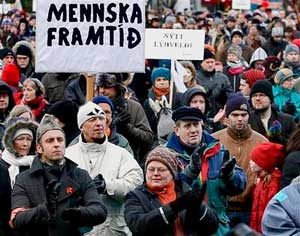Iceland government collapses as protests escalate
By
Michael Kramer
Published Feb 1, 2009 7:59 PM
The worldwide crisis of international finance capital has resulted in the
collapse of the bourgeois coalition government ruling Iceland. Elections for a
new government will be held two years early, in the spring of 2009.
Iceland is an island nation of approximately 313,000 residents located in the
North Atlantic. It is a member of NATO. Its climate is tempered by the Gulf
Stream and its surrounding waters contain some of the richest fishing grounds
in the world. It is also rich in geothermal and hydroelectric energy. Homes are
heated by putting pipes into the ground.
|
Protest in Iceland’s capital city, Reykjavik,
Jan. 24.
|
As in much of the capitalist world, the government and economy in Iceland have
been controlled by MBAs and other finance technocrats. In October 2008 the
economic structure they built came crashing down, resulting in the failure of
the three largest banks, falling standards of living, devalued currency and a
deep freeze with regard to imports and exports.
In the capital city, Reykjavik, ongoing demonstrations against the government
have intensified, growing bigger and more militant. On Jan. 20 more than 2,000
protesters surrounded the parliament, throwing snowballs and smoke bombs. On
Jan. 21 the prime minister’s car was attacked by a larger crowd.
The demonstrations continued into the night. On Jan. 22 the police used tear
gas for the first time since 1949.
On Jan. 24 the biggest demonstration yet took place, with around 6,000
protesting—about 2 percent of the population. This is akin to a
demonstration of 6 million in the United States.
The minister of commerce and banking resigned the next day.
At this time it is not known where all this is going in Iceland. There are
militant youths confronting the bourgeois state but there does not appear to be
any revolutionary party involved in the struggle. Similar situations have
recently occurred in Bulgaria, Latvia and Lithuania.
Articles copyright 1995-2012 Workers World.
Verbatim copying and distribution of this entire article is permitted in any medium without royalty provided this notice is preserved.
Workers World, 55 W. 17 St., NY, NY 10011
Email:
[email protected]
Subscribe
[email protected]
Support independent news
DONATE


